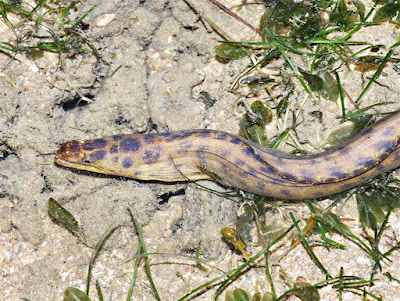I'm back at Chek Jawa, one of the two seashores that started my passion in marine life (the other is Tanjong Rimau, Sentosa). It's like visiting your friend that has been there all along through different seasons. That applies to both the shore and myself. We were able to visit this shore with permission from Nparks.
Here's how it looks like way before sunrise. We surveyed most parts of the coral rubble, near the beacon, on this trip.
The sponges seem to be doing better on this trip as compared to last year. Above shows a collage of the different types of sponges.
The Purple branching sponges (Callyspongia sp.) are definitely making a comeback! So much so that they colonised and grow among seagrasses. Something that we don't often see.
With sponges, there would be also slugs that tend to feed on them. Here's the Black-margined nudibranchs (Doriprismatica atromarginata).
The Purple foot nudibranch (Atagema spongiosa) is usually so well camouflaged that we miss spotting them. However, I managed to find this because the purple foot was pointing upwards.
The Pink ascidians are also doing very well at the jetty pilings of Chek Jawa. And of course the Blue-spotted flatworms (Pseudoceros indicus) were having a great time feeding on them.
It's my first time seeing the Marbled flatworms (Pseudoceros sp.) and they tend to be found on Beige sheet ascidians.
Here's a closer look at the Marbled flatworm. The flatworm is edged with a fine narrow line and has really nice patterns on its surface.
How are the corals doing during this bleaching period? Most, if not all of the Flowery soft corals (Family Nephtheidae) are bleaching.
About 50% of the hard corals were bleaching. Most of the ones we came across are Boulder Pore corals (Porites sp.).
Here's a healthy-looking Boulder pore coral that is all brown and well.
The coral rubble habitat is made of a nice mix of seagrass, rubble and sponges. And there's lots of critters to find.
I managed to find one adult Knobbly sea star (Protoreaster nodosus) and believe there are more elsewhere.
Jonathan found this pretty adult-sized Cake sea star (Anthenea aspera) in brown and yellow. Lovely!
And here's the assortment of sea stars sighted on this trip.
As the Flowery soft corals get bleached, the commensal Tiny colourful brittle stars (Ophiothela danae) become more conspicuous.
More commensals sighted include the Sponge synaptid sea cucumbers found around sponges.
Here's another shot of the synpatid sea cucumbers around the purple branching sponge.
And you would notice there are also more critters living among the sponges such as the porcelain crabs.
Another not common-sighted fish would be this Brown spotted moray eel (Gymnothorax reevesii).
Till next year, Chek Jawa!




























No comments:
Post a Comment